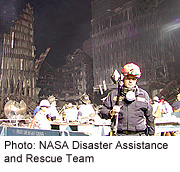
TUESDAY, Dec. 18 (HealthDay News) — The workers who toiled at the World Trade Center site after the Sept. 11, 2001, attacks may have higher-than-average risks of certain cancers, health officials reported.
Using data from an ongoing health study of World Trade Center survivors and recovery workers, researchers found that, overall, people’s risk of developing cancer was no higher than the norm.
But among the nearly 22,000 rescue and recovery workers, there were elevated risks of three cancers: prostate cancer; thyroid cancer; and multiple myeloma, a type of blood cell cancer.
The findings, reported in the Dec. 19 issue of the Journal of the American Medical Association, are based on small numbers. Overall, 67 men developed prostate cancer, while only 13 workers developed thyroid cancer, and seven developed multiple myeloma. That makes it tougher to reach statistically solid findings.
And it’s not certain that exposure to toxic compounds at the site caused the excess cancer risks, said senior researcher Steven Stellman, research director for the New York City health department’s World Trade Center Health Registry.
He noted that the study is “observational,” which means the researchers looked at cancer rates in the group and tried to account for other factors in anyone’s cancer risk — such as age and smoking habits.
Even with those factors weighed, rescue and recovery workers still had elevated risks compared with the norms for New York state: a 43 percent higher risk of prostate cancer, and more than double the risk of thyroid cancer and multiple myeloma.
But there’s still a lot to be learned, according to Stellman. It will take years for researchers to understand the extent of any cancer risks from exposure to the World Trade Center wreckage.
“It’s really too early to make any definitive statements,” Stellman said.
Other experts agreed. “It is important to recognize that the relatively short time since the exposure limits what we can currently conclude from this type of data,” said Elizabeth Ward, national vice president for intramural research for the American Cancer Society.
Screening could have something to do with the heightened rates of prostate and thyroid cancers, Ward noted. If recovery workers had more cancer screening tests than the general public, then they may have had more prostate and thyroid tumors detected.
On the other hand, Ward said, the lack of increased odds for other cancers — or cancer overall — “does not rule out the possibility” that risks could emerge in the future.
Dr. Michael Crane, who directs the World Trade Center Health Program at Mount Sinai Medical Center in New York City, said, “We’re just at the beginning [of research] when you’re talking about cancer.”
As a doctor on the ground, Crane was not surprised to see an excess risk of certain cancers. A few years ago, doctors at Mount Sinai reported an unexpectedly high number of young multiple myeloma patients among World Trade Center responders in their program.
Out of more than 28,000 responders, there were four cases of multiple myeloma among people younger than 45 — when, statistically, only one case would be expected.
Still, Crane said big-picture studies like the current one are needed, in order to know if the risks really are higher than normal.
The findings are based on nearly 56,000 people enrolled in the World Trade Center Health Registry, an ongoing study of the physical and mental health effects of the disaster. Almost 22,000 of those people were rescue and recovery workers.
Overall, there was no evidence of a higher cancer risk among workers or people who lived or worked near the towers, Stellman said.
It was only when the researchers focused on individual cancers that they found elevated odds for three cancers among rescue and recovery workers.
Dozens of cancers were just recently added to the list of ailments covered by a government fund for first responders and survivors of the 9/11 attacks.
In September, the U.S. National Institute for Occupational Safety and Health announced that cancer treatment will be covered under the Zadroga 9/11 Health and Compensation Act, which was passed into law two years ago.
Officials originally left cancer off the list of covered ills, citing a lack of scientific evidence linking exposure to the toxic fumes at the World Trade Center site to any cancers.
While the new findings suggest at least certain cancers are increased among workers, Ward and Crane also emphasized the brighter side: “The study results are reassuring that there does not appear to be a large increase of cancer in WTC-exposed populations at this time,” Ward said.
“It’s important to remember that most of these people are not going to develop cancer,” Crane said.
He also noted that people exposed to the disaster site can take steps to reduce their cancer risks. “Do not smoke. Eat a healthy diet. Folks should keep doing what they can to maintain a healthy lifestyle.”
More information
Learn more about the health effects of the World Trade Center disaster from the U.S. Centers for Disease Control and Prevention.

